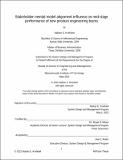| dc.contributor.advisor | Moser, Bryan R. | |
| dc.contributor.author | Krehbiel, Nathan E. | |
| dc.date.accessioned | 2022-08-29T16:21:49Z | |
| dc.date.available | 2022-08-29T16:21:49Z | |
| dc.date.issued | 2022-05 | |
| dc.date.submitted | 2022-06-28T20:27:14.762Z | |
| dc.identifier.uri | https://hdl.handle.net/1721.1/144931 | |
| dc.description.abstract | The engineering of complex systems-of-systems requires management of dependencies and coordination between multidisciplinary teams-of-teams. Coordination strategies and the understanding of supporting mechanisms are critical in the execution. Mental models are cognitive structures used to describe system form and function and predict outcomes. The concept of shared mental models, the influence of shared mental models, and the methods of elicitation and analysis are all relatively recent and active areas of study. This thesis reviews past work in these domains and proposes a treatment to stimulate the development of two attributes of shared mental models in the context of mid-stage project development of R&D teams. This work explores the influence of structured context tools on sharedness and breadth of team shared mental models and in turn, team shared mental model influence on team performance within the mid-stage R&D context. An experiment was designed placing participants in a team-based, role-play scenario where they were asked to work as a team-of-teams developing a system-of-systems, in particular the verification and validation activity of that development. Information was collected on team mental models utilizing a concept similarity rating elicitation method and analyzed utilizing Pathfinder network and pairwise comparison methods. Performance data was collected via custom software and analyzed utilizing a Pareto fitness ranking method. Trends were detected in the data indicating the importance of shared mental model development. Limitations, recommendations, and future areas of study are provided, including recommendations to: adjust the application of the treatment, include additional instrumentation in the experiment, and explore additional attributes of the teams’ mental models. | |
| dc.publisher | Massachusetts Institute of Technology | |
| dc.rights | In Copyright - Educational Use Permitted | |
| dc.rights | Copyright retained by author(s) | |
| dc.rights.uri | https://rightsstatements.org/page/InC-EDU/1.0/ | |
| dc.title | Stakeholder mental model alignment influence on mid-stage
performance of new product engineering teams | |
| dc.type | Thesis | |
| dc.description.degree | S.M. | |
| dc.contributor.department | System Design and Management Program. | |
| dc.identifier.orcid | 0000-0002-0232-7950 | |
| mit.thesis.degree | Master | |
| thesis.degree.name | Master of Science in Engineering and Management | |
